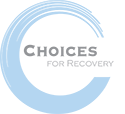It is commonplace for individuals to feel shame and resentment with a relapse. Sometimes these feelings can be so strong that it keeps the person mired in dishonesty and active addiction. A pathway forward involves being honest, open and willing- admitting to a problem, asking for help and practicing a recovery program. At Choices for Recovery, a goal is to help individuals learn from a relapse, instill hope, and help them recover.
A key element of the disease model is that addiction effects the decision-making and attachment areas of the frontal cortex. This supports reasons for an addict’s poor decision-making (succumbing to the thought just one more time) despite their readiness and motivation to change. This is most evident in the individual that once surrenders, who recognizes honestly and openly that they have had enough but again relapses. Taking a nonjudgmental, compassionate, humble, supportive, positive, and encouraging approach with a twist of directiveness helps these challenging times. It has seemingly been an effective approach to support a person’s recovery process.
Choices clinical team is here to help individuals find their path. With using best practice approaches like cognitive behavioral therapy, motivational enhancement therapy and 12- step facilitation in tandem with holistic approaches, an individual is provided ideas for an effective recovery approach in hopes that an individual chooses their path to recovery.
Hollis Crittendon, the founder of Choices for Recovery had a lot of experience with recovery and relapse. He realized in his journey that the best approach for him was one consistent with the previously mentioned characteristics. These characteristics of being nonjudgmental, compassionate, and supportive created an energy for his recovery that he tirelessly imparted to those in the throes of their addiction. Hollis saw relapse as part of the recovery process which enabled him to maintain a sense of humility and openness with the addict who still suffered in HOPES that they find their path to freedom. To that end, through the support of family and friends, Choices for Recovery has started the Hollis HOPE Scholarship for Recovery.
Choices for Recovery Clinical Team
